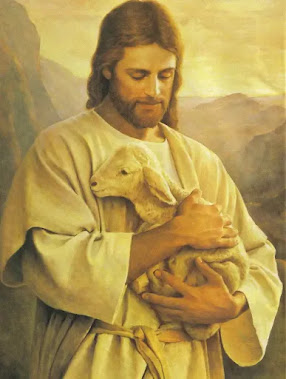I am the good shepherd.
In another place Jesus asked a man why he called him good, since none was good but God alone (see Mark 10:18). He asked him that question in order to invite him a more profound realization of the identity of Jesus himself, to infer from the goodness in him what that must have meant about who he was. In the letter of James we read that, every "good gift and every perfect gift is from above, coming down from the Father of lights" (see James 1:17). Goodness, then, is not some negligible quality based on subjective appeal or other pretense. It is something so real as to be inimitable. It is such a powerfully evident reality as to demonstrate that it has divine origins.
I am the good shepherd.
Israel had a long list of leaders who were not good shepherds, who did not depend on God in order to care for the sheep. Rather, they were the hired men whose sheep were not their own, who worked for pay, that is, whatever they value they could extract from the sheep at no cost to themselves. God himself had long been fed up with abusive shepherds exploiting his sheep. He saw his sheep scattered by wolves and promised to himself seek them out, rescue them, and be the shepherd over them.
I myself will be the shepherd of my sheep, and I myself will make them lie down, declares the Lord GOD (see Ezekiel 34:15).
No one was good but God alone. So too was there no truly good shepherd but God himself in the form of Jesus Christ. The other leaders who made the pretense of being shepherds did not see the sheep as truly their own and therefore ran for the hills at the hint of danger. But God himself did not see his sheep as a mere job or responsibility. He considered them to be truly his own, to the extent that he was willing to give of himself for them, even unto laying down his life for the sheep.
I am the good shepherd,
and I know mine and mine know me,
We have difficulty imagining an earthly shepherd becoming so attached to his flock to die for it. But this is the extreme and even unreasonable love that God has for us. Because of his love for us he knows each one of us by name, individually, and would have died for any one of us even if we were the only person to exist. Yet their exists far greater disparity between ourselves and God than between a literal shepherd and actual sheep. Even so, God's love bridged that infinite distance because of his desire to be near us. He compared his care for us to that of a shepherd for his sheep precisely so we could see how God's own love for us is so extreme as to appear insane in any other context.
This is why the Father loves me,
because I lay down my life in order to take it up again.
Jesus demonstrated the love of the Father with which he so loved the world by his willingness to give himself for the life of the world. It was this uniquely divine ability to pour all of himself out in love, expressed in human form, that made Jesus the one true gate and the only shepherd that was truly and completely good. It was therefore also a revelation of the love between the Father and the Son and of their love for us.
No one takes it from me, but I lay it down on my own.
I have power to lay it down, and power to take it up again.
Other shepherds could become good only by sharing in the goodness of Jesus himself. Only his risen life in us could empower us to follow where our brave shepherd went first. This is important because he did not lay down his life to leave the flock in the same state in which he found it when he came at his incarnation. Instead, he made it possible for the flock to be a new society founded on divine love and goodness, that he first demonstrated, and that are now his gifts to us. For this reason one of the main marks of the flock of Jesus would be unity, the 'one' in 'one, holy, catholic, and apostolic'. This level of unity simply wasn't possible in a society of mercantile give and take. But infused with God's own love this was now a real possibility for the Church. The fact that we don't often embody it our live it out doesn't make it any less true.
We need supernatural help to avail ourselves of the gifts of Jesus to his bride, the Church. We need messengers to help us transcend discrimination, and spiritual gifts to unite those without natural affinity for one another. Acts of the Apostles is the prototype for this unity. We can see that living this out doesn't come without challenges but also that it is most definitely possible if we are willing to follow the Spirit's lead.
As I began to speak, the Holy Spirit fell upon them
as it had upon us at the beginning

No comments:
Post a Comment